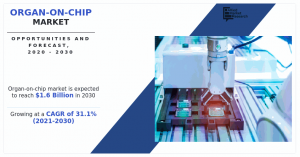
PORTLAND, OREGON, UNITED STATES, April 28, 2023 /EINPresswire.com/ -- Organ-on-chip technology is an innovative approach to studying the human body's physiological functions and responses to drugs or diseases. It involves engineering miniature versions of human organs, which are then placed on a microfluidic chip and subjected to various stimuli. This technology has gained significant attention in the scientific community due to its potential to replace animal testing and improve drug development.𝐓𝐡𝐞 𝐨𝐫𝐠𝐚𝐧-𝐨𝐧-𝐜𝐡𝐢𝐩 𝐦𝐚𝐫𝐤𝐞𝐭 𝐡𝐚𝐬 𝐞𝐱𝐩𝐞𝐫𝐢𝐞𝐧𝐜𝐞𝐝 𝐫𝐞𝐦𝐚𝐫𝐤𝐚𝐛𝐥𝐞 𝐠𝐫𝐨𝐰𝐭𝐡 𝐢𝐧 𝐫𝐞𝐜𝐞𝐧𝐭 𝐲𝐞𝐚𝐫𝐬, 𝐝𝐫𝐢𝐯𝐞𝐧 𝐛𝐲 𝐭𝐡𝐞 𝐢𝐧𝐜𝐫𝐞𝐚𝐬𝐢𝐧𝐠 𝐝𝐞𝐦𝐚𝐧𝐝 𝐟𝐨𝐫 𝐩𝐞𝐫𝐬𝐨𝐧𝐚𝐥𝐢𝐳𝐞𝐝 𝐦𝐞𝐝𝐢𝐜𝐢𝐧𝐞 𝐚𝐧𝐝 𝐭𝐡𝐞 𝐫𝐢𝐬𝐢𝐧𝐠 𝐩𝐫𝐞𝐯𝐚𝐥𝐞𝐧𝐜𝐞 𝐨𝐟 𝐜𝐡𝐫𝐨𝐧𝐢𝐜 𝐝𝐢𝐬𝐞𝐚𝐬𝐞𝐬. 𝐀𝐜𝐜𝐨𝐫𝐝𝐢𝐧𝐠 𝐭𝐨 𝐚 𝐫𝐞𝐜𝐞𝐧𝐭 𝐫𝐞𝐩𝐨𝐫𝐭 𝐛𝐲 𝐀𝐥𝐥𝐢𝐞𝐝 𝐌𝐚𝐫𝐤𝐞𝐭 𝐑𝐞𝐬𝐞𝐚𝐫𝐜𝐡, 𝐭𝐡𝐞 𝐦𝐚𝐫𝐤𝐞𝐭 𝐰𝐚𝐬 𝐯𝐚𝐥𝐮𝐞𝐝 𝐚𝐭 $103.44 𝐦𝐢𝐥𝐥𝐢𝐨𝐧 𝐢𝐧 2020 𝐚𝐧𝐝 𝐢𝐬 𝐩𝐫𝐨𝐣𝐞𝐜𝐭𝐞𝐝 𝐭𝐨 𝐫𝐞𝐚𝐜𝐡 $1.6 𝐛𝐢𝐥𝐥𝐢𝐨𝐧 𝐛𝐲 2030, 𝐠𝐫𝐨𝐰𝐢𝐧𝐠 𝐚𝐭 𝐚 𝐂𝐀𝐆𝐑 𝐨𝐟 31.1% 𝐟𝐫𝐨𝐦 2021 𝐭𝐨 2030.The market growth can be attributed to several factors, including the increasing adoption of organ-on-chip technology by pharmaceutical companies, the growing investment in R&D activities, and the increasing prevalence of diseases such as cancer, diabetes, and cardiovascular diseases. Additionally, the rising demand for alternative methods to animal testing is expected to drive the market further in the coming years.The organ-on-chip market is expected to witness significant growth due to the increasing demand for drug screening and the rise in demand for lung- and kidney-based organ culture devices. The shortage of donor organs and the availability of laboratory-engineered functional organs are also expected to be major advantages in catering to the growing demands of organ transplantation. However, the high cost of organ chip devices and the fact that organ-on-chip technology is still in its nascent stage may restrain the growth of the market.On the other hand, the considerable rise in healthcare expenditure across the globe has led to an increase in the size of the organ-on-chip market. Emerging economies, in particular, possess high potential for the market due to the increasing number of chronic diseases, the high requirement for organ transplantation, and the surge in animal testing for drug discovery.Companies in the organ-on-chip market are focusing on product development and innovation to meet the growing demand for these products. They are also focusing on strategic collaborations and partnerships to strengthen their market position and increase their revenue share. In addition, regulatory bodies such as the FDA are providing guidance and support for the development and use of organ-on-chip technology in drug development and testing, which is expected to further boost the growth of the market.
𝐈𝐧𝐪𝐮𝐢𝐫𝐞 𝐁𝐞𝐟𝐨𝐫𝐞 𝐁𝐮𝐲𝐢𝐧𝐠: https://www.alliedmarketresearch.com/purchase-enquiry/2555Key Market Players𝐀𝐱𝐨𝐒𝐢𝐦 𝐓𝐞𝐜𝐡𝐧𝐨𝐥𝐨𝐠𝐢𝐞𝐬 𝐋𝐋𝐂, 𝐁𝐈𝐂𝐎 𝐆𝐫𝐨𝐮𝐩 𝐀𝐁(𝐕𝐢𝐬𝐢𝐤𝐨𝐥), 𝐂𝐍 𝐁𝐢𝐨 𝐈𝐧𝐧𝐨𝐯𝐚𝐭𝐢𝐨𝐧𝐬 𝐋𝐢𝐦𝐢𝐭𝐞𝐝, 𝐄𝐥𝐯𝐞𝐟𝐥𝐨𝐰, 𝐄𝐦𝐮𝐥𝐚𝐭𝐞, 𝐈𝐧𝐬𝐩𝐡𝐞𝐫𝐨 𝐀𝐆, 𝐌𝐢𝐦𝐞𝐭𝐚𝐬 𝐁.𝐕., 𝐍𝐨𝐫𝐭𝐢𝐬 𝐈𝐧𝐜., 𝐎𝐫𝐠𝐚𝐧𝐨𝐯𝐨 𝐇𝐨𝐥𝐝𝐢𝐧𝐠𝐬, 𝐓𝐚𝐫𝐚 𝐁𝐢𝐨𝐬𝐲𝐬𝐭𝐞𝐦𝐬
The organ-on-chip market is segmented by type and region.𝐁𝐲 𝐭𝐲𝐩𝐞, the market is segmented into heart on chip, human on chip, intestine on chip, kidney on chip, liver on chip, and lung on chip. The human on chip segment holds the largest market share due to the increasing demand for personalized medicine and the rising prevalence of chronic diseases. The liver on chip segment is also expected to witness significant growth due to the increasing need for drug toxicity testing.𝐁𝐲 𝐫𝐞𝐠𝐢𝐨𝐧, the market is segmented into North America, Europe, Asia-Pacific, and LAMEA. North America holds the largest market share due to the presence of leading pharmaceutical companies and the increasing investment in R&D activities. Europe is also expected to witness significant growth due to the rising demand for alternative methods to animal testing and the increasing focus on personalized medicine.The Asia-Pacific region is expected to witness the fastest growth due to the increasing prevalence of chronic diseases and the rising demand for organ-on-chip technology in drug development. China and India are the major contributors to the market growth in this region. LAMEA is also expected to witness significant growth due to the increasing investment in healthcare infrastructure and the rising demand for personalized medicine.

